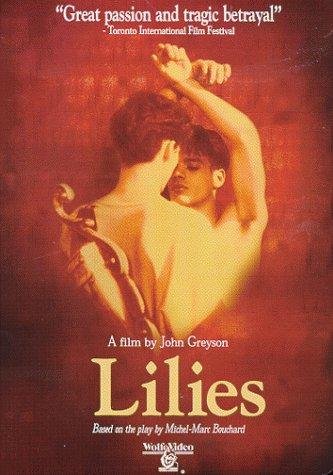Mychael DANNA. Lilies, a film by John Greyson
The Hilliard Ensemble et al.

amazon.com
mychaeldanna.com
imdb
Turbulent Arts - Varese Sarabande VSD 5868
(C) & (P) 1997
The Priory, Church of St. Mary and St. Blaise, Boxgrove, East Sussex.
Lilies, a film by John Greyson
Mychael Danna,
(c) 1996
(except #12, from the Sarum Rite of Tenebrae)
01 - Libera Me [3:00]
02 - Ave Verum Corpus [2:17]
03 - Kyrie [0:36]
04 - Kyrie II [3:27]
05 - Gloria [3:21]
06 - Lux Aeterna [1:42]
07 - Alleluia, Justus Germinabit [1:28]
08 - Sanctus I [0:51]
09 - Sanctus II [2:28]
10 - Benedictus I [0:38]
11 - Benedictus II [1:14]
12 - Lamentations of Jeremiah [6:49]
13 - In Paradisum [1:45]
14 - Dies Irae I [3:16]
15 - Dies Irae II [1:29]
16 - Pie Jesu [2:08]
17 - Libera Me [3:02]
18 - Agnus Dei [3:36]
THE HILLIARD ENSEMBLE
David Jame
Gordon Jones
John Potter
Rogers Covey-Crump
David Gould, contratenor (Gloria, Alleluia, In Paradisum, Agnus Dei)
Kenan Burrows, soprano (Ave Verum Corpus)
Kirk Worthington (en la bandeja, pero Heatherington en las notas...), cello
Robert Grim, trumpet
In writing the score for Lilies (winner of the Best picture
prize at the 1996 Genie Awards), composer Mychael Danna turned to the
music of the Catholic church, a central institution in Quebec history,
and the source of most intellectual and artistic life dating from the
Middle Ages through the Dark Ages to hundreds of years later. In order
to standardize religious services and to enforce the central authority
of the church, the Popes established a body of official music.
Consisting originally of unaccompanied, monophonic material for voices
without a fixed rhythm, this music became known as Gregorian Chant
(named after pope Gregory I, circa 540-607). For the rest of the Lilies
score, Danna turned to the traditional "Ordinary of the Mass," the
"Mass for the Dead," and the "Lamentations" from the Sarum Rite of
Tenebrae.
The "Ordinary" is the most important service of the Roman Catholic
church and consists of five invariable sections, several of which are
included here: Kyrie, Gloria, and Sanctus and Benedictus; also included
is an Alleluia, one of the six chants in the "Proper of the Mass." The
more flexible "Proper" allows for texts to vary according to a
particular time of the church year. An example of later, non-Gregorian
plainchant in the score is "Dies Irae" ("The Day of Wrath"), the most
famous of fifteenth century tropes. The composer also incorporates
several segments of the traditional "Requiem Mass," including Libera Me
(used for the main and end titles), Lux Aeterna, In In Paradisum and
Pie Jesu, in addition to the traditional hymn Ave Verum Corpus. The
music itself is all original, composed by Danna within medieval
modalities. For his vocal lines he employs the Gregorian technique of
melisma, in which groups of notes are used for a single syllable of
Latin text. Performed by the world renowned, English-based Hilliard
Ensemble, the score is written in both a cappella style and for solo
cello and trumpet (Kirk Heatherington and Robert Grim, respectively).
Supplementing the textures are the haunting vocal stylings of boy
soprano Kenan Burrows. While reflective of the religious spectre that
informs much of Quebec's past, Danna's music becomes even more
affecting when contrasted with the mores and music of the secular age
that Lilies foreshadows.
About The Composer
Mychael Danna is the leading composer of music for Canadian films.
Educated at the University of Toronto, Danna was the recipient of the
1985 Glenn Gould Composition Award. Much of his early film success
stemmed from his association with Atom Egoyan, the most critically
acclaimed Canadian director of his generation. Their work together
includes Family Viewing (1987), Speaking Parts (1989), The
Adjuster (1991, selected as one of the ten best Canadian
films ever made at the 1994 Toronto Film Festival), Exotica
(1994, which won the International Critics' Prize at the 1994 Cannes
Film and eight Genies including Best Picture, Best Director, and Best
Score) and The Sweet Hereafter (1997, winner of theGrand Prix
and two other top jury prizes at the 1997 Cannes Film Festival). Other
recentworks include Mira Nair's Kama Sutra, Ang Lee's The
Ice Storm and the upcoming film adaptation of John Grisham's The
Gingerbread Man.
Kevin Mulhall


